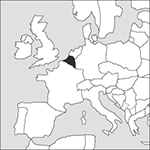
Capital:
Brussels
Area:
30,518 sq km (11,783 sq miles)
Population:
10,444,268 (2012 est)
Currency:
1 euro = 100 cents
Religions:
Roman Catholic 75.0%
Ethnic Groups:
Fleming 58.0%; Walloon 31.0%
Languages:
Flemish, French, German (all official); Italian
International Organizations:
UN; EU; NATO; OECD; Council of Europe; OSCE; WTO
A country in north-west Europe on the North Sea. It is bounded inland by The Netherlands, Germany, Luxembourg, and France.
Physical
The coastal area comprises broad, sandy beaches backed by dunes. Inland, most of the rivers run across the flat, fertile Flanders Plain, north-eastward to The Netherlands. In the south-east the land rises from the Sambre–Meuse valley to the highlands of the Ardennes. Here the soil is poor, and the land generally forested. The Campine coalfield is in the east.
Economy
Service industries are of great importance, partly because of the location in Brussels of the headquarters of the EU, NATO, and other international institutions. Industries include engineering, metal products, vehicle assembly, and transportation equipment. Other than coal, Belgium has no natural resources and processes imported raw materials. Major exports include machinery, chemicals, finished diamonds, and metal products. Agriculture is limited to production for the domestic market.
History
Belgium takes its name from the Belgae, one of the peoples of ancient Gaul, but by the 5th century immigrations from the north had resulted in a large settled German population. After several centuries under the Franks the region split into independent duchies and, especially in Flanders, free merchant cities. In the 15th century all of what is now Belgium became part of the duchy of Burgundy, but the Low Countries (which included Belgium) in 1477 passed by marriage to the Habsburg empire of Maximilian I. They were later absorbed into the Spanish empire, and in 1713 passed to Austria. Belgium was occupied by France in 1795 during the French Revolutionary wars.
Following the defeat of Napoleon, Belgium became one of the provinces of the kingdom of The Netherlands in 1815. However, in 1830 it separated from The Netherlands following a national revolution, and Prince Leopold of Saxe-Coburg was elected king. After an unsuccessful Dutch invasion, an international treaty was drawn up guaranteeing Belgian neutrality in 1839. In the later 19th century Belgium’s King Leopold II (1865–1909) headed an international Association of the Congo (1876), following the exploration of the River Congo by H. M. Stanley. This association was recognized at the Berlin Conference (1884) as the Congo Free State, with Leopold as its unrestrained sovereign. As the Congo was opened for trade, appalling atrocities against Africans were committed, leading to its transfer from Leopold’s personal control to the Belgian Parliament (1908). Independence was granted to the Congo in June 1960, but was immediately followed by violence and bloodshed.
In 1914 Germany’s invasion of Belgium precipitated Britain’s entry into World War I. The country was occupied by the Germans, against whom Albert I (1908–34) led the Belgian army on the Western Front. When Germany invaded again in 1940 Leopold III (1901–83) at once surrendered. However, a government-in-exile in London continued the war, organizing a strong resistance movement. After the war Leopold was forced to abdicate (1951) in favour of his son Baudouin (1930–93). After World War II the main task for Belgium was to unite the Flemish-speaking northerners with the French-speaking Walloons of the south. In 1977 the Pact of Egmont, introduced by the Prime Minister, Leo Tindemans (1922–2014), recognized three semi-autonomous regions: that of the Flemings in the north, the Walloons in the south, and Brussels. The regions of Flanders, Wallonia, and Brussels were given greater autonomy by a constitution, adopted in 1993, that defines Belgium as a federal nation. Wilfried Martens (1936–2013) was Prime Minister from 1979 to 1992. Following his death in 1993, King Baudouin was succeeded by his younger brother, Albert II (1934– ), who abdicated in 2013 and was succeeded by his son, Philippe (1960– ) in July 2013. Belgium adopted the euro as its currency in 1999–2002. In the 2000s Flemish–Walloon political tensions led to political instability and increasing difficulty in forming governments. It took until March 2008 for a coalition to be formed after the June 2007 elections and more than a year to form a government after the 2010 elections. In 2014 elections saw the New Flemish Alliance become the largest party, but a coalition government took months to form, an alliance of Flemish parties with the Francophone Reform Movement, whose leader, Charles Michel, became Prime Minister.
- Perry, Ralph Barton (1876–1957)
- Perry, Robert H. (1924–78)
- Perseid meteors
- perseity
- per se notum
- Persepolis
- Perseus
- Perseus A
- Perseus Arm
- Perseus Cluster
- Pershing, John Joseph (1860–1948)
- Persia
- Persian wars
- persimmon
- persistence
- persistent
- persistent cookie
- persistent data
- persistent organic pollutant
- persistent programming
- persistent state
- persistor
- person
- personal area network
- personal assistant